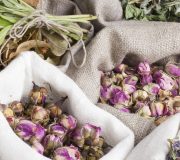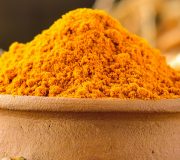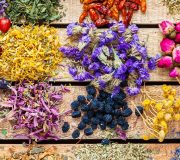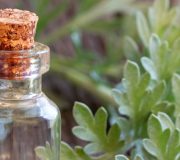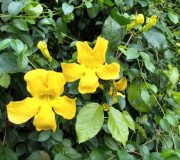About this Episode
In this episode, Marisa Marciano, ND, RH, returns to talk with host Daina Parent, ND, to talk about the rich history of botanical medicine. In particular, this conversation is about what we know regarding traditional uses and evidence-based uses of medicinal herbs — and the impact the entire body of knowledge has on modern herbal medicine.
What is the Impact of Herbal History on Modern Clinical Applications?
The tradition of herbal knowledge undoubtedly influences modern clinical applications of herbs (01:40). Marisa explains a significant factor of how exactly this happens through herbal teaching: “Who taught you what you know about herbs? What’s being passed down to you?” Other important concepts in herbal traditions include:
- The Biophilia Hypothesis: the idea that there is an innate emotional affiliation between humans and nature, which is deeply connected to the therapeutic potential of plants (02:36)
- Doctrine of Signatures: a theory commonly cited in herbal literature that describes how humans discovered the medicinal uses of plants through their physical characteristics and environment (11:33)
Herbal Energetics
Herbal energetics is a concept used to describe herbal connections to elemental qualities, such as hot/warm, yin/yang, organ system affinities, and more (05:34). The idea of herbal or plant energetics is closely connected to the long history of ancient medical systems viewing disease as an imbalance or energy disturbance in the body. Practitioners may then use the energetic principles associated with a particular plant to address the imbalance or disturbance. Marisa emphasizes the importance in her practice of aiming to personalize herbal prescriptions by “matching the herbal picture to the patient picture,” including that individual’s physical, emotional, and mental state.
Herbal Constituents
Herbal constituents are the individual chemical components which make up a plant’s phytochemical profile; they are an important plot point in the broader story of why utilizing the whole plant is so fundamental to herbalism (20:35). They are often termed secondary metabolites, defined as such because they are chemicals that the plant makes for its own purposes – chemicals that were eventually discovered to have medicinal properties in the human body. Examples of herbal constituents include alkaloids, flavonoids, tannins, and mucilage.
While many herbal constituents have been isolated and often even synthesized to make pharmaceutical drugs (see Marisa’s note about artemisinin @), the traditional uses of herbs were almost always used in conjunction with diet, exercise, and other lifestyle practices. Additionally, the emphasis on utilizing the whole herb paradigm continues to be strong. Many isolated herbal constituents have been labeled with pharmacological extrapolations and unwarranted safety concerns unless isolated and dosed in a similar fashion to pharmaceuticals (27:38).
What Can Modern Herbalists Learn from the Past?
There are several fundamental, historical herbal concepts that modern herbalists can apply to clinical applications of medicinal herbs: (28:49)
- Take only what we need: building consciousness of sustainability practices in herbal medicine
- Use the whole plant
- Integrate an individualized approach to herbal practice
- Evaluate evidence with a critical eye








